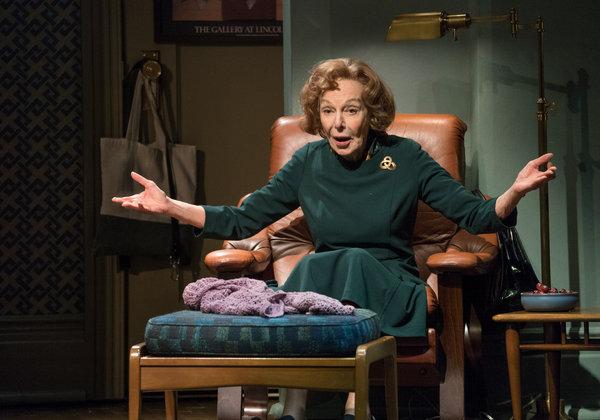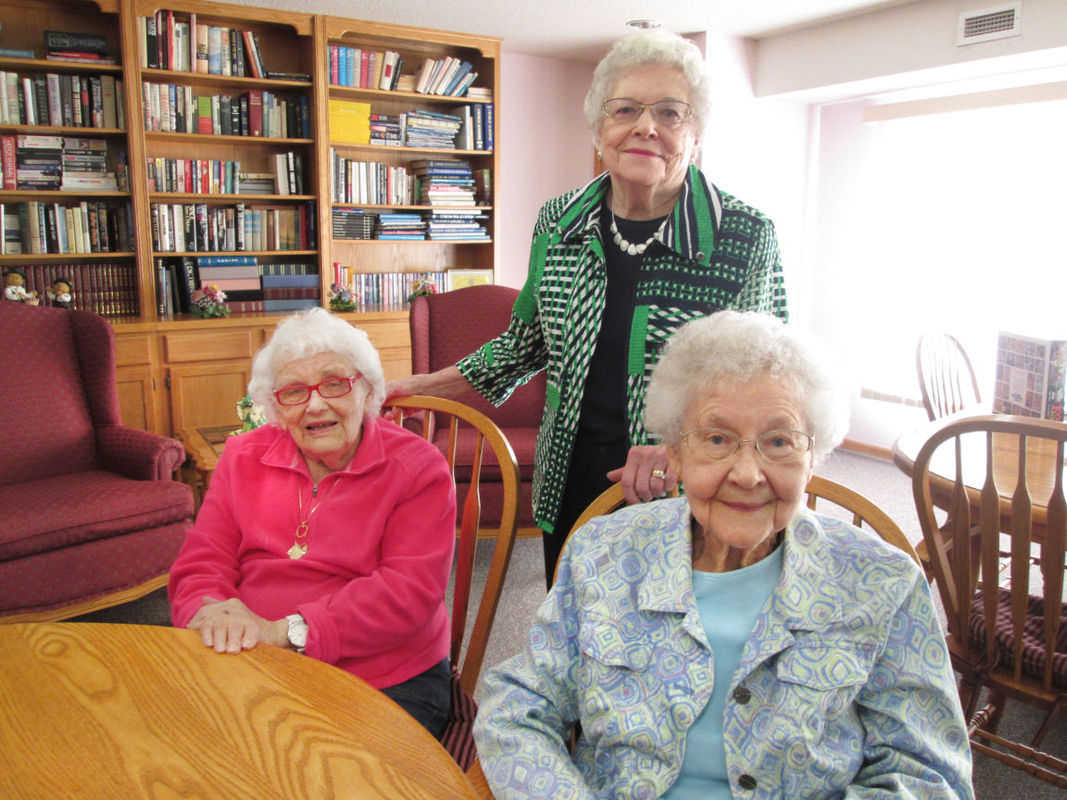|
“Her mind was smashed to pieces … but the pieces were still her pieces.”
Thus the narrator of “The Waverly Gallery,” a remarkable play now on Broadway, describes his 85-year-old grandmother as dementia warps her once-brilliant mind beyond recognition. This production of Kenneth Lonergan’s drama, a finalist for the Pulitzer Prize, is a brutally honest look at the effects of dementia both on the one afflicted with the disease and on the family as a whole. It is perhaps the smartest thing ever said on the subject, fiction or nonfiction. In wrapping up his rave review of the play for The Wall Street Journal, drama critic Terry Teachout wrote, “It would be unfair not to warn you going in that if you have any firsthand experience with caregiving, you may find certain parts of ‘The Waverly Gallery’ to be almost unendurably painful to watch.” He’s not kidding. Seeing the play brought back excruciating memories of the years when my mother cared for my father during his battle with Alzheimer’s disease … followed by the period when my sister and I helped care for our mother as dementia ravaged her mind and spirit. Lonergan, whom Teachout calls “America’s greatest living dramatist,” explores the nature and progress of dementia via the character of Gladys Green, a once-prominent lawyer who in her later years opened a small art gallery in Greenwich Village to keep her busy. But now, even the gallery is too much for her to manage, as her family discovers early on in the play. Later, we watch Gladys’ mind unravel during family dinners and other encounters with her daughter, son-in-law and grandson, as well as a young artist whom Gladys invites to hang paintings in her gallery. They struggle to contain their frustration and even anger at Gladys as she constantly repeats herself and makes one mistake after another – for example, giving snacks to the family’s overweight dog despite incessant pleas not to feed him. “It is a harrowingly honest group portrait of the havoc wrought by that disease, not only on those who have it but on those who love them,” Teachout writes. Ben Brantley, reviewing “The Waverly Gallery” for The New York Times, says Lonergan drew on his own experiences watching his grandmother struggle with dementia. The play, Brantley writes, “is a group portrait in which everyday life is distorted to the point of surrealism by the addled soul at its center.” In addition to a powerful script, the production at the John Golden Theater is supported by a brilliant cast, including the great screenwriter, director and comedian Elaine May in the role of Gladys Green. May herself is 86 years old. “Here’s a hell of an acting challenge,” Vinson Cunningham writes in reviewing “The Waverly Gallery” for The New Yorker. He likens the play to “an experiment in speculative neuroscience: What happens when a large personality persists but comes unbound from the structures of memory, custom, and comprehension that once contained it?” Also in the cast is Joan Allen, recognizable from prominent film roles including "The Bourne Supremacy," and Michael Cera, who left an indelible mark in the teenage love story “Juno.” Better than any article or book I’ve read on the subject, the ensemble cast conveys in an immediate and visceral way the emotional and spiritual toll dementia takes on a family. “A family is a finicky machine: when one part starts to falter, the whole thing slows to a halt,” Cunningham smartly observes. “There’s nothing like one member’s slide toward death to send the others spiraling backward and inward – inspecting old arrangements and restarting lapsed arguments, wondering just what it was, besides blood, that ever held them together.” “Spiraling backward and inward” – that’s as good a metaphor as I can imagine for the experience of caring for a loved one who suffers from dementia. Written by T.J. Foderaro
1 Comment
Caring for an elderly parent, especially one who is physically frail and congitively impaired, is challenging under the best of circumstances. Even with home-care aides to help out, I often felt overwhelmed managing my mother’s finances, grocery deliveries, doctors’ appointments and correspondence -- not to mention weekly chores and home repairs at her condominium in Highalnds.
But in retrospect, I had one very big advantage: my youth. Perhaps the word should be in quotes -- “youth” -- for in fact I was in my early 50s when my mother started to decline. But I was healthy and strong and more or less satisfied both professionally and financially. And my sister, a constant companion in my efforts to help our mom, was similarly situated -- and three years younger. What if it had been otherwise? What if my mother lived another 15 years, at which point I myself would have been a senior citizen? What if I had my own health problems? What if I, too, struggled with memory loss? I was prompted to consider such possibilities by an excellent piece of journalism that appeared last week in the Arizona Daily Star. The lengthy article is topped by an appropriately lengthy headline: “As We Live Longer, More Older Adults Face Caring for Even Older Parents.” It’s not surprising. Since I was born, the average life expectancy in the United States has risen from about 70 to 79. And in healthier, wealthier parts of the country, including Monmouth County, it’s not unusual for men and women to live well into their 90s. According to a recent report from the Center for Retirement Research at Boston College, 12% of children who are caring for elderly parents are themselves 70 or older. At Twin Lights Home Care, about half of our clients are at least 90 years old. More than a few have children in their mid- to late 60s. The Arizona Daily Star spoke to several families in which children in their 60s and 70s are still providing care for their parents. “Caring for frail parents in their 90s and early 100s can be daunting while the caregivers themselves are in their 60s or even 70s,” according to the article. “The situation is forcing older adult children, some of them at or nearing retirement age, to decide if they are physically, mentally and financially capable of caring for a parent at the end of their lives.” The article cites the case of a 100-year-old woman who is cared for by her seven children, ranging in age from 59 to 73. The mother suffers from dementia, has very limited hearing and vision and uses a wheelchair. Imagine the mental, physical and emotional strains that puts on her children. “She would not sleep at night,” said one of her sons, who is 64. “In the day, she would stand at the gate outside yelling for help for 45 minutes. She would try to climb over the fence. It was very stressful.” The situation improved somewhat after a doctor adjusted the woman’s medication. But her children continued to struggle. “We wondered and questioned, could we do this – care for her and keep her safe?” one daughter said. “We relied on each other and learned as we went along.” Although their own retirements have been less than peaceful and relaxing, the sons and daughters of this 100-year-old woman have remarkably positive attitudes. “I find strength in the love I have for her,” a 69-year-old daughter says. “She did so much for me. It is our turn now to do for her. It is not a burden. It is a blessing caring for her.” Written by T.J. Foderaro The challenge of caring for an elderly parent, especially one with Alzheimer’s disease or other form of dementia, can have a damaging ripple effect on the rest of the family. Inevitably, the burden of daily phone calls, food shopping, doctor’s visits and financial support falls more heavily on some family members than others – typically, those who live closest to the parent. And typically women, studies show.
This can generate serious tension and resentment among siblings that can simmer for months -- or even years -- before exploding in potentially destructive ways. “Of all the difficulties family caregivers face, one of the biggest sources of stress is trying to get on the same page with our siblings,” writes elder-care expert Jody Gastfiend in an Aug. 29 column on Forbes magazine’s website. “While many siblings experience increased closeness caring for their parents, others grow apart.” Gastfriend cites a survey conducted by the Alzheimer’s association that found six out of 10 family caregivers feel they don’t get enough support from their siblings when caring for an elderly parent. Gastfriend’s column – titled “When Siblings Share the Caregiving for an Aging Parent, Will It Be Welfare or Warfare?” -- is a must-read for anyone in this situation. Gastfriend is uniquely qualified to offer advice, having spent years caring for her own parents. She now serves as vice president of senior-care services at Care.com, the leading online marketplace for home-care services. Gastfriend also is the author of an excellent new book titled “My Parent’s Keeper: The Guilt, Grief, Guesswork and Unexpected Gifts of Caregiving” (Yale University Press). In an earlier blog post, I highlighted a chapter of the book that addresses the thorny issue of how to care for aging parents who don’t want help. In her Forbes column, Gastfriend relates the true story of two sisters who suddenly were faced with the challenge of caring for an 89-year-old father who developed Parkinson’s disease. One sister, Kelly, took the initiative to hire a caregiver to help her father with meals, light housekeeping, errands and other essential tasks. But the other sister, Fran, became furious when she learned about the arrangement. Fran felt strongly that her father should be transferred to an assisted-living facility. “It shouldn’t have to be this hard,” Kelly told Gastfriend. “After all, my sister and I both love my father. Why can’t we agree on things?” According to Gastfriend, a common source of conflict among siblings is differing perceptions of a.) how serious a parent’s condition is, and b.) the best way to help. If family members can’t reach a consensus, Gastriend recommends seeking professional guidance from an eldercare manager, also known as an aging life care manager. You can find one through the Aging Life Care Association, which maintains a database searchable by zip code. Another source of conflict is money. Gastfriend cites a recent AARP report that says family members together spend an average of $7,000 per year caring for an elderly parent. “When siblings fight over money, they can lose sight of what is in the best interest of their parents. If disagreements become entrenched, it may be worth reaching out for expert help.” Among those most qualified to offer advice in this area are elder-care attorneys and financial planners. Sibling conflicts can be avoided, or at least mitigated, by holding a family meeting – a topic I addressed in an earlier blog post. The Family Caregiver Alliance offers a comprehensive how-to guide on planning and conducting a family meeting. It’s essential that family members begin communicating early and often, because the stress level will only increase when it comes time to discuss end-of-life care. As Gastfriend observes, “all the forces that pull us apart and hold us together can come roaring to the surface as families face difficult decisions regarding end-of-life care. … Planning ahead can avoid the risk of intractable conflicts that may linger for years –- even generations -- after the death of a parent.” Of course discussing a parent’s impending death is perhaps the most difficult –- and stressful -– conversation siblings will ever face. If you feel you need help in this area, a good resource is The Conversation Project, a website that offers a free “starter kit” to guide siblings in their discussions. Written by T.J. Foderaro |
AuthorT.J. Foderaro Archives
February 2020
Categories
All
|
Copyright © 2023, Twin Lights Home Care, All RIghts Reserved



 RSS Feed
RSS Feed
